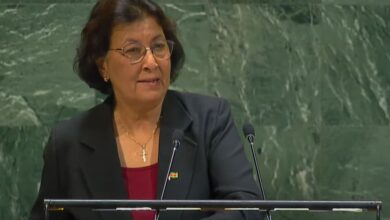Ending the epidemic of Non-Communicable Diseases (NCDs) is a daunting but not an insurmountable task that will require increased investment, innovative financing, stronger partnerships, and policy action, Dr. Carla Barnett, CARICOM Secretary-General, said Thursday.
Speaking at a High-Level Breakfast on Noncommunicable Diseases (NCDs) and Mental Health in the margins of the 80th United Nations General Assembly (UNGA) in New York, Dr. Barnett highlighted the Region’s 18-year leadership since the 2007 Port-of-Spain Declaration, which catalysed a multisectoral response to NCDs.

While initiatives like Caribbean Wellness Day and the elimination of trans fats reflect progress, most Member States are not on track to meet the 2025 mortality reduction target, with only Antigua and Barbuda, Barbados, and Grenada showing promise.
The Secretary-General emphasised the need for additional investment, stronger global collaboration, and policy action to address persistent gaps, compounded by climate change and rising mental health concerns. She reaffirmed CARICOM’s commitment to advancing equitable, collaborative health strategies across the Region.
Please read the Secretary-General’s remarks below:
- Excellencies, Heads Government of the Caribbean Community (CARICOM);
- Other Representatives of Member States;
- Dr. Jarbas Barbosa, Director of the Pan-American Health Organization/ World Health Organization (PAHO/WHO);
- Dr. Lisa Indar, Executive Director, Caribbean Public Health Agency;
- Dr. Kenneth Connell, President, Healthy Caribbean Coalition;
- Representatives of International Development Agencies;
- Ladies and Gentlemen.
Welcome to this very important conversation on Non-communicable Diseases (NCDs) and Mental Health, on the margins of the Fourth United Nations (UN) High-Level Meeting on Non-communicable Diseases and Mental Health. I express our gratitude to the Caribbean Public Health Agency (CARPHA), the Pan-American Health Organization/World Health Organization (PAHO/WHO), and the Healthy Caribbean Coalition (HCC), for their collaboration with the Secretariat to host this high-level engagement.
The theme of today’s event “From Port-of-Spain to HLM4 – Celebrating 18 years of CARICOM Leadership on NCDs,” encapsulates the pivotal role that CARICOM has been playing in shaping the global agenda on the response to NCDs. In 2007, Heads of Government issued the Port-of-Spain Declaration, fully convinced that the burden of NCDs in the Region could be reduced by implementing integrated prevention and control strategies. They advocated a whole-of-society approach, fuelled by collaboration with governments, private sector, NGOs, and development partners. They were determined to stop the epidemic of NCDs in what was acknowledged as one of the most affected Regions in the Americas.
Eighteen years later, we can rightly celebrate that some progress that has been made. Member States have expressed their commitment to address the risk factors for NCDs, through the agreement to eliminate the use of trans-fatty acids in the Region. Further, Caribbean Wellness Day, the Hearts Initiative, and Caribbean Moves, are some of the collective, multisectoral initiatives that focus on promoting healthy lifestyle choices.
Notwithstanding these achievements, there are still gaps to be filled. The NCDs at a Glance 2025 Report indicates that progress towards the global NCD targets is slow, and the overall goal of a 25% reduction in premature NCD mortality by 2025 will not be met by most Caribbean countries. We acknowledge the efforts of the three CARICOM Member States – Antigua and Barbuda, Barbados and Grenada – which are on track to meet this target1.
The reality is that limited fiscal resources complicate our efforts. To bridge funding gaps, we must explore innovative financing models and foster public-private partnerships. Furthermore, enhancing global collaboration and effective monitoring will be crucial in implementing equitable prevention and treatment strategies for NCDs.
As Small Island Developing States (SIDS), the impacts of climate change further compound our response. Climate change is directly impacting the health and well-being of the Region, and people in vulnerable groups – such as those with disabilities – are at greater risk. The increase in the prevalence of mental health conditions has also become cause for concern.
Chair, delegates, while daunting, ending the epidemic of NCDs in CARICOM is not an insurmountable task. There are lessons learnt over the past 18 years, which, if utilised, could strategically position the Caribbean Community in the next 10 years.
This will require redoubling efforts, a greater level of investment to accelerate the regional response, and the commitment of all stakeholders to address NCDs through coordinated, multilateral partnerships. It will also require strengthened social safety nets, investment in assistive living technologies for an increasingly ageing population, legislative action, and regional policy development.
Commendations are due to CARPHA, our lead public health agency, for its ongoing guidance and support to overcome NCDs; to PAHO for its continued support to operationalising the Joint Strategy, especially in priority areas for health; and to the HCC for its continued advocacy on critical NCD prevention and control issues. I also acknowledge the crucial role played by CARICOM Heads of Government for their political support and national investments, even under complex economic challenges.
Excellencies, ladies and gentlemen, as I close, I reaffirm the Secretariat’s continued support for NCD initiatives, and our willingness to explore options for deeper engagement to help to advance the outcomes of this morning’s engagement.
Thank you.






